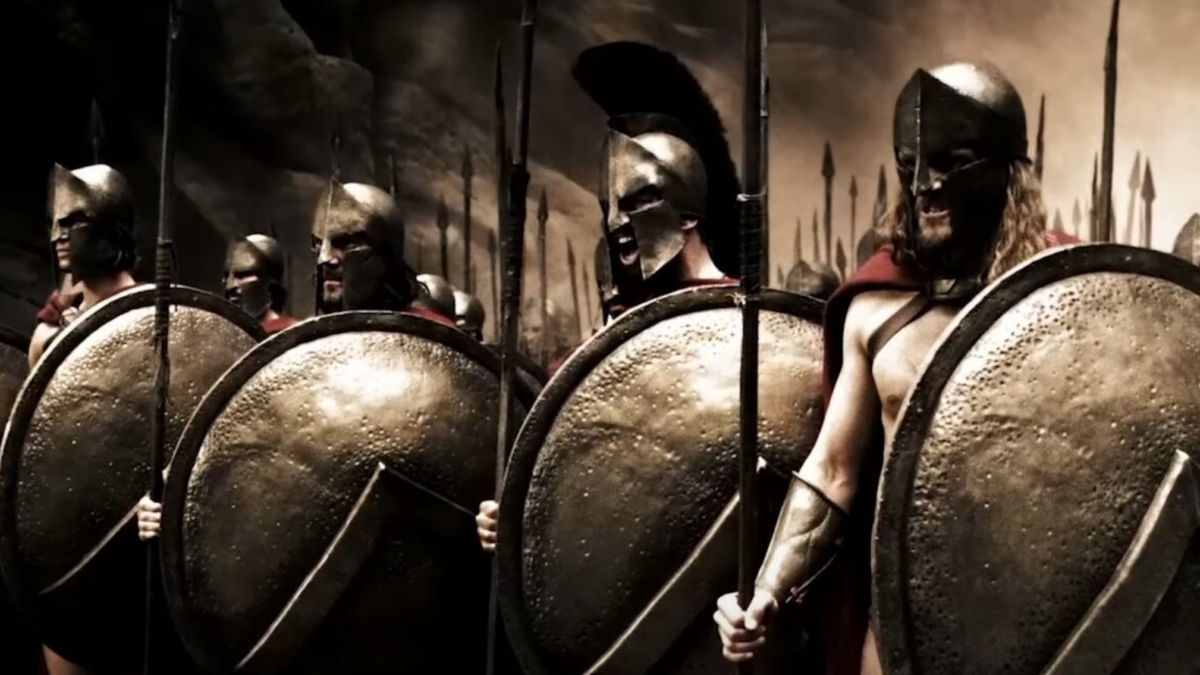The warriors from other Greek city-states were usually farmers first and soldiers second — but Spartans dedicated their lives to battle.
The article completely ignores Sparta’s well-merited, legendary military reputation and falsely tars Sparta as “fascist.” This characterization is not only vague but also self-defeating. One of the standout characteristics of fascist regimes is their militarism, yet Devereaux describes Sparta as a pleasure-loving society of weaklings with an unmerited reputation for military might.
Devereaux also states that the Spartan brand has “become a political rallying cry, including by members of the extreme right who stormed the U.S. Capitol on Jan. 6, 2021.” Trying to tar and feather what he calls the “Spartan brand” by associating it with Jan. 6 makes as much sense as claiming that McDonald’s should be associated with the communist Soviet flag because of its red and yellow color scheme.
He expresses special concern for the “U.S. military’s love of all things Spartan.” Perhaps the fact that some service members love watching “300” is less concerning than the military’s recruiting crisis, the result of its embrace of critical race theory, medical mandates, and drag shows.
Devereaux did not discuss Sparta’s sophisticated political system. The Spartans had a unique dual monarchy in which two kings from different dynasties shared their rule, limiting the power of both. The kings also shared power with an executive council of magistrates known as ephors, a Spartan “Senate” called the Gerousia that included Spartans over age 60, and the Apella, a democratic assembly representing Sparta’s free male citizenry.
It’s true that Spartan society had its difficulties and flaws. Life was harsh for Spartan citizens. They dedicated their lives to military discipline and ate food that would make many modern stomachs churn. The married men couldn’t even see their wives until the age of 30 due to the demands of life in the barracks, at which they were legally forced to spend years of their lives.
The Spartan system relied on an underclass of slaves, known as helots, to care for the land and produce food. The Spartans brutally treated the helots, but if we call them “fascist” because they held slaves, then that would make everyone in the ancient world, from Gallic tribes to the Persian Empire, a goose-stepping Nazi.
Spartan society wasn’t perfect, and we shouldn’t emulate every aspect of it. It still, however, formed a remarkable network of checks and balances that gave the Spartan state stability for a long time and prevented a tyrant from arising in the mold of a Nero or a Caligula. It might have influenced the Roman Republic’s system of checks and balances and thus, indirectly, America’s — considering how much inspiration the American founders drew from ancient Rome.
So much for Spartan politics. Is Devereaux correct in his critique of Sparta’s military?
Devereaux disagrees with the presentation of the Spartans as “superior warriors from an ultra-militarized society bravely defending freedom,” and he argues the Spartans’ military might is overrated. To support this revisionist statement, he claims they were “tactically and strategically uncreative,” that they lacked military innovation, and that their famous agoge educational system was not “an intense military bootcamp” but rather “primarily designed to instill obedience and conformity rather than skill at arms or tactics.”
It’s true that the Spartans weren’t eight-foot-tall super soldiers with Arnold Schwarzenegger muscles who thought only of war and whose six-packs could stop a bullet. But they were still widely recognized to be the best soldiers of ancient Greece.
Qualified Spartan men fought as full-time professional soldiers at a time when the rest of the Greek world relied on part-time hoplite levies with only limited military training. The warriors from other Greek city-states were usually farmers first and soldiers second — but Spartans dedicated their lives to battle.
It is this commitment to having a professional standing army that allowed the Spartans to gain a significant edge over their enemies. Spartans put a premium on fitness as well as continual drilling: They “drilled relentlessly, until they could execute tactics with perfection.” As the historian Paul Cartledge points out in The Spartans, their “constant drilling” led to “tight co-ordination, rigid discipline and high morale,” granting them a level of professionalism that their adversaries simply could not match.
Other advantages of Spartan armies included their unique ability for “stealthy movement by night” (as Cartledge explains), their wearing of a red uniform that gave their armies the appearance of unity, and their high officer-to-soldier ratio that improved their command ability and made maneuvering more efficient.
Perhaps the best argument for Sparta’s fearsome reputation is what their enemies knew about them. Devereaux might think the Spartans were pansies, but he’d have a tough time convincing the Athenians, who, for almost the entire three-decade duration of the Peloponnesian War, refused to meet the Spartans in open battle on land. The only major pitched land battle that Athenians and Spartans fought during this war was the Battle of Mantineia — a decisive loss for the Athenians.
Finally, Sparta played a crucial role in defending Greece during the Persian king Xerxes’ invasion. They not only fought to the death at Thermopylae, but they were also all-important in the Battle of Plataea, in which an alliance of Greek city-states defeated the main Persian army and finally banished the Persians from mainland Greece forever.
Pointing to certain Spartan defeats throughout their long history to try to demonstrate their weakness, as Devereaux attempts, does not negate the fact that their military reigned supreme for much of ancient Greek history.
We can admire Sparta’s military, its achievements on the battlefield, and its complex political system. We cannot cave to the pressure of presentists who want to cancel an entire ancient culture. This path, as we have seen, leads to calumniating our own history, tarring the Founding Fathers as irredeemably evil, and slandering anything they’ve ever accomplished, including the Constitution and America’s founding ideals.
So don’t feel guilty the next time you watch “300,” read the excellent Gates of Fire, or run the Spartan Race — all of which Devereaux lists in his lament of cultural phenomena that have adopted the “Spartan brand.” Instead, be encouraged to learn more about this fascinating ancient warrior society, not ignoring their flaws but still appreciating their heroism and skill.
https://thefederalist.com/2023/08/11/is-this-sparta-revisionists-get-the-legendary-warriors-all-wrong/


No comments:
Post a Comment